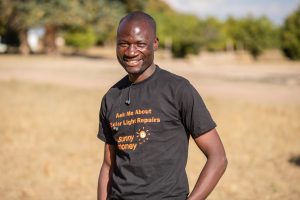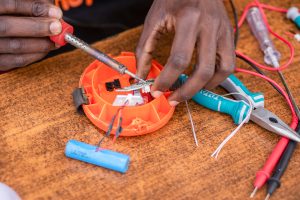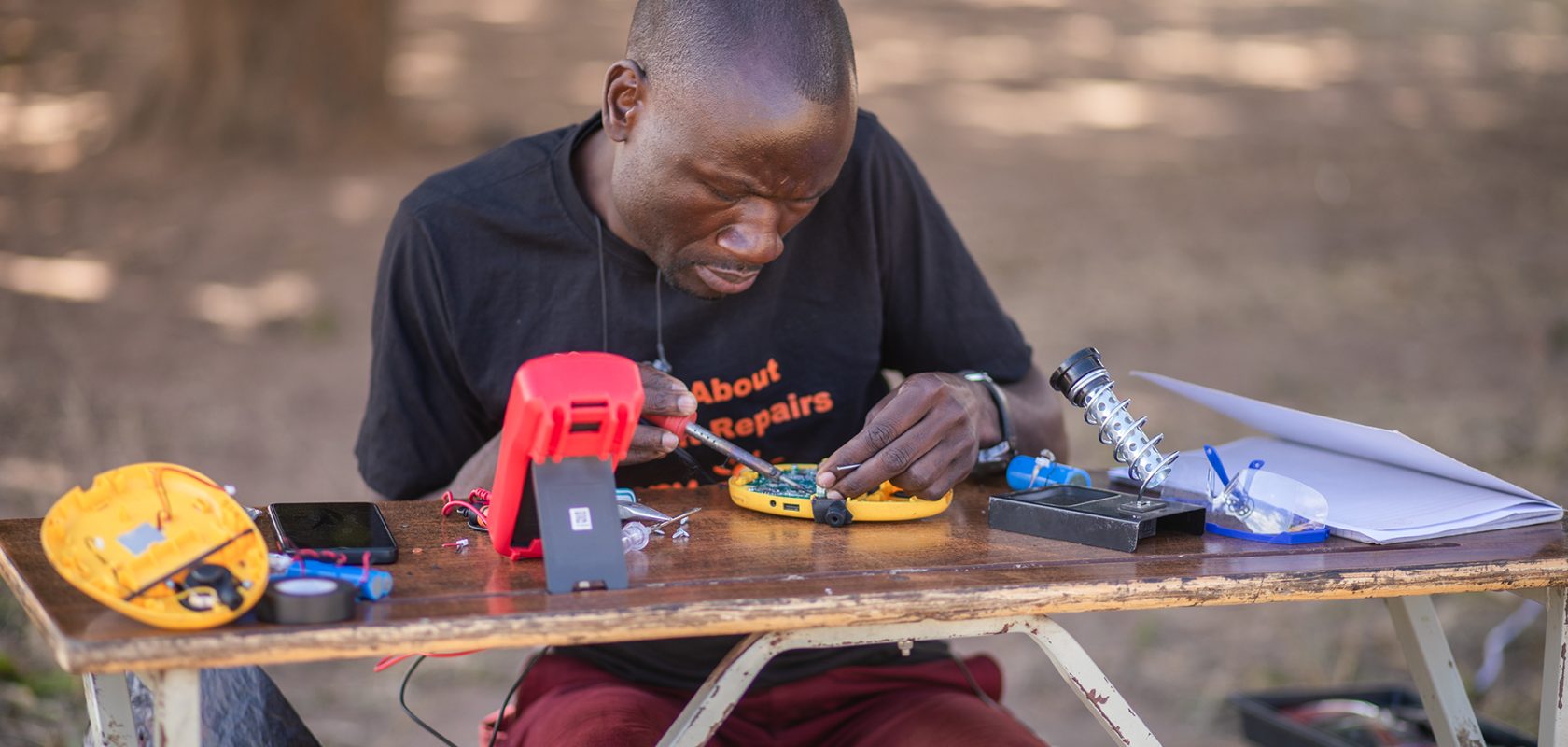Climate change is being felt in the rural parts of Zambia. The rain pattern has shifted, some areas are suffering from floods while others are going through dire dry spells, making harvest difficult. Small solar lights are playing an important role in combating the use of dirty, dangerous fuels like kerosene or cheap batteries that are discarded days after buying, but what happens when a solar light breaks or reaches the end of its useful life?
In an effort to limit its contribution to the growing problem of electronic waste, SolarAid has launched its e-waste programme which both explores how to safely discard electronic waste such as solar lights in rural areas of Zambia and Malawi, as well as builds capacity of local technicians in rural communities to repair common solar lights faults, giving second life to many solar lights.
This means that customers can continue enjoying clean, safe and affordable solar light even longer, and faulty products will not end up contributing to the growing problem of electronic waste.

34-year-old Rodgers Mwaba lives with his wife and three children in the town of Kapiri Mposhi in Central Zambia.
On the side of working as a farmer, he is a repair technician of solar lights for SunnyMoney Zambia. “I heard about the opportunity from SolarAid/SunnyMoney staff who approached me at my shop here in Kapiri Mposhi, asking if I would be interested in being a repair technician. I was the only one selected from many that were approached in Kapiri Mposhi. I love and enjoy what I do. The job of a technician is not seasonal as appliances can get damaged or may need repair at any time.”
On the repair day in Kapiri Mposhi, Rodgers has set up his table, ready to meet customers who brings their light to be repaired. One of the customers this day is Peggy Hamalambo, a 49 year old teacher who has been using solar lights in her home for three years, “I have brought my solar light for repair and I want to purchase another light from SunnyMoney (…) The light just stopped working and I felt bad, so I kept it safe until now that you have come to do some repairs. I didn’t know that one day it will be repaired, I just kept the light because I liked it. And now that it is being repaired, it makes me feel happy to see it back to life.”
Seeing his customers happy when their light has been repaired is what motivates Rodgers, “what I love about this job is seeing things that weren’t working come back to life, it brings me joy and satisfaction.”

Repair Technician Rodgers Mwamba with with Hamalambo Peggie.
Rodgers, who bought his first solar light at a repair technician workshop is pleased with it and though his training with SolarAid, he has learned what the most common issues are and how to prevent them from happening, “Solar is actually a good renewable source of energy, the issue comes in when people become careless, like leaving the solar panels or the entire light in the rain. Such would damage the panel and the light with some ports becoming faulty.”
The repair days in Kapiri Mposhi is part of SolarAid’s efforts to limit their own contribution to the problem of electronic waste while at the same time giving second life to the solar lights which makes such a big difference in the lives of the families living in rural Zambia.
Finding safe ways to discard electronic waste where the lights are beyond repair is another way to battle climate change, which is something felt by everyone in this part of Zambia, “Electronic waste can be dangerous to the environment, especially batteries. For me, I recycle and keep some elements for spare parts. Then for those completely out of use, I keep in a bin and wait for the council to collect for proper disposal. In this regard, I would want to teach my fellow technicians on proper disposal of electronic waste because it is not only batteries that are harmful to the environment, some other electronic components also have adverse effects when not disposed of well,” explains Rodgers, and continues, “The effects of climate change have been felt here, things like change in rainfall patterns and sometimes drought.”
Teaching the coming generation about climate change, as well as the dangers of some waste is important to Peggy who says, “Some [electronic waste], I throw in the bin and others like glass, I throw in the pit latrine to protect children. Children pick them up and just start playing with them,” she continues, “We do teach our pupils about climate change and there is a topic solely dedicated to climate change. There is a need to sensitize people on electronic waste and its contribution to climate change. Some don’t do it deliberately; it is just because they do not know the dangers and how to properly dispose of the waste.”

Repair Technician Rodgers Mwamba soldering wires.
Peggy is pleased to see the efforts are being made to repair lights, as well as to help discard dangerous waste from the rural areas, “Climate change is real and I believe most of it has been caused by human activity. For instance, the improper burning of electronic waste may produce dangerous fumes to both the people and the environment (…) With this repair program that has come, it is more like recycling and protecting the environment from such harm. So, it is very commendable. Continue with the work so that we keep the environment safe and clean while bringing these lights back to life.”
Rodgers, who has now been a repair technician of solar lights for 5 months, is now looking to the future. “In terms of my business, I hope to grow, especially with SolarAid. My hope is for SolarAid to continue offering the technical support we have been receiving so as to continue servicing the many customers in these areas. With continued support, we will do and achieve more.”
